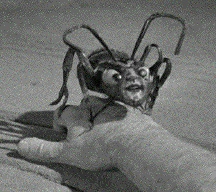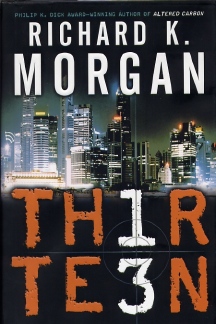Trashotron.com |
||
This Just In...News From The Agony Column
06-22-07: Preview for Podcast of Monday, June 25, 2007 : Compelling reading.Here's an MP3 preview of the Monday June 25, 2007 podcast for The Agony Column. Enjoy!
06-22-07: Harvey Pekar and Heather Roberson Visit 'Macedonia'
What does it take to stop a war?
"You humans, however, are practiced executioners."
Of course we are. Or need that be the case? Last year, when I talked to Harvey Pekar, he told me about his work-in-progress with Heather Roberson. That work has finally arrived in the form of 'Macedonia' (Villard / Random House ; July 3, 2007 ; $17.95). Pekar ventures pretty far outside his comfort zone with this book, focusing not on the minutia of daily life, but instead on world-changing issues and Big Questions. At least apparently. But a closer look shows that Pekar simply uses his old friend, daily detail, and applies it to the larger canvas to tell Roberson's – and Macedonia's – story.
The story begins with Roberson eating lunch in the caff. She's joined by a craggy-looking professor of Poli Sci, who quickly belittles her chosen major of (only in Berkeley, alas) "Peace and Conflict Studies". But the prof is a straight shooter, and the conversation ends with Heather wondering why nobody ever heard of the UN's stunning success in Macedonia, waging peace.
Yes, waging peace.
As IF you're ever going to hear anything positive about the UN in this reason-forsaken country of Big Biz media outlets.
This is Harvey Pekar, so you know the story is real, and Pekar, collaborating with Roberson, follows Roberson's journey as she pursues the peace that dare not speaketh it's name. Pekar's vision is, as ever, focused on the streets that Roberson walks, the people she talks to in all regards, mundane as well as monumental. By keeping us locked in to the actual journey that Roberson took, Pekar makes the spiritual journey of discovery all the more powerful. From the details emerge a story that's pretty damn incredible. Figure that in this reason-forsaken world, the only way you’re going to hear this story is via the graphic novel talents of Pekar, Roberson and illustrator Ed Piskor.
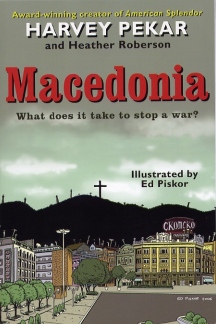
...and the skies are gray, I went for a walk on a winter's day.
Confronted with no actual knowledge of what happened when peace broke out in Macedonia, Roberson goes there to find out. This is not a blessed journey, and she meets the same variety of people that you meet in real life and in Pekar's other work. He'll give you an eyeful of creep-on-the-make as well as the faces of faceless functionaries. Piskor creates not only a gallery of memorable faces but as well, memorable backgrounds. It’s one thing to focus on the story and the people, but one of the strengths of 'Macedonia' is that Piskor fills many frames with scenes of life on the streets and in the houses of a country most of us have little time for.
'Macedonia' is published in the smaller 6" x 9" trade paperback format, and I'm sort of torn about the decision to do so. At eighteen bucks, it ain't cheap, and the resulting panels are on the small side. A certain percentage of Pekar's audience is going to be getting out the reading glasses. But the layout is extremely clean and readable, and the smaller size does seem to impart an intangible sense of – quality? – import? – I can't quite put my finger on it – to the material. It concludes with an all-text Epilogue: "It will be an ongoing adventure, which will be frustrating and scary at times, and which is likely to yield more questions than answers."
And the bigger picture emerges with greater clarity for all the attention to detail. Peace is possible. There are stories of peace that you’re not going to hear because peace doesn't serve the political agenda. Peace can break out at any moment. Perhaps, one day, a race of aliens will arrive in a flying saucer, little ants with horrific human faces, and they'll us that, "You humans, however, are practiced peacekeepers."
Most of us would relegate such a vision to the never-ever genre of science fiction.
06-21-07: Junot Díaz Explains 'The Brief Wondrous Life of Oscar Wao'
Ghetto Nerd At the End of the World
Few things happen quickly. You keep your eyes open, keep an open mind when it comes to reading. Maybe last year, and it was only a year ago, you managed to get round to picking up 'Absurdistan' by Gary Shteyngart. I'd never have known about it, but they sent it my way, and it proved to be one of the funniest books I'd read in a long, long time. And it was the first incidence in my experience of what is apparently a new literary archetype. The Ghetto Nerd, manifested in 'Absurdistan' by Misha Vainberg.
The Ghetto Nerd is back, this year in 'The Brief Wondrous Life of Oscar Wao' (Riverhead Books / Penguin Putnam ; September 6, 2007 ; $24.95) by Junot Díaz. Yes, that Junot Díaz, the guy how published 'Drown', an acclaimed short story collection some ELEVEN YEARS AGO. In case you thought he dropped off the edge of the Earth, no, it didn't happen. One can hem and haw about what he's been doing in the interim, but the printed pages and the words on them are ultimately what matters to readers. These printed pages, the story of Ghetto Nerd Oscar Wao, as narrated by Yunior, are pretty much flat out hilarious, and filled with the kind of sentences that slip past your brain yet evince a skill that is simply mind-boggling.
Ghetto Nerd. Here's what you've got to have. Your character has to have one foot firmly in two worlds. One of them is the er, ghetto, so to speak, a hyper-dense slab of urban turmoil generally located on the East Coast. The other world had best be well beyond the boundaries of the US of A. Gary Shteyngart's Misha Vainberg hailed from the non-existent country of Absurdistan, an amalgam of all things –Stanish. Junot Díaz's Oscar Wao has his other foot in the Dominican Republic. So let's assert that Ghetto Nerd's non-USian foot had best be firmly planted in a country that is at best of dubious stability.
Ghetto Nerd must be fat. "Catastrophically fat", fat enough so that there is just no friggin' way that Ghetto Nerd is going to get anything more than a fleeting, friendly kiss from the girls during the critical High School years. It doesn't matter that Ghetto Nerd is smart and funny. He's not getting' any, and this will scar him for life.
Nerd being right there in the description, Ghetto Nerd must have some Nerdish qualities, whether they be the facility for business that Misha Vainberg brings to the table or a love of comic books, science fiction and Lord of the Rings that Oscar carries like a torch in the night. Oscar sees the world through this filter, and I bet that this will make a lot of ears that are otherwise thinking, "Literary, shmiterary Rick, tell us about a cool new monster novel!" stop and take notice. (I'm waiting for it to arrive. Hope it does!) So, no monsters herein, exactly, though Rafael Leónidas Trujillo Molinai, the one time fearless leader of the Dominican Republic, is asked to stand in for Sauron. But viewing the world through an LOTR lens is pretty cool.
Ghetto Nerd also needs a digressive tone. Díaz goes for footnotes, and god knows, I love fiction with footnotes. Shteyngart did not go for footnotes, but I do recall he'd digress into historical sidelines that were inevitably some of the most interesting portions of the text. Footnotes rule, and they're pretty well used here. Díaz even uses the word supernerd in one of them. This so totally rules, it's not even funny.
Except for the fact that humor is an absolute requirement for Ghetto Nerd. Look, you're corpulent, smart, self-aware, and well-spoken. Humor has got to be part of the equation, because otherwise, you'd like, kill yourself. And finally, ultimately, for all the Ghetto Nerd archetype creation, somewhere along the line, someone has got to read the damn book. Lots of people do if anyone is going to get a meal or two out of it. So the writing here is top-notch. We’re not talking a few good jokes. We're talking about a prose style that is consistently ultra-smart, very witty and filled with the kind of mordant self-aware, self-deprecating Humor Shield that Ghetto Nerds need to stay alive.
You might think – YOU MIGHT THINK – that this whole litrary thing is not your deal. Fine, think that. But if you make the mistake of picking up 'The Brief Wondrous Life of Oscar Wao' by Junot Díaz, what going to happen is this. The prose will eat your brain. And thus does literature itself become a cool monster.
06-20-07: Richard Morgan's 'Th1rte3n' vs. 'Black Man'
Marketing Forces
Here's a book that has a history, at least for me. I'll never forget sitting in the dingy back-offices of the World Science Fiction Convention in Glasgow in 2005. My wife and I were talking with Richard Morgan about his new novel, titled 'Black Man' (Orion / Victor Gollancz ; May 17, 2007 ; £14.99). Back then, it was set about hundred years in the future, in the early 22nd century, after the fallout of 100 years of mismanaged genetic engineering. Morgan told me that, "this is not dystopian in the sense that it’s all gone to shit. In fact, the world is quite a bit more peaceful and ordered than it is now or indeed in my other fiction."
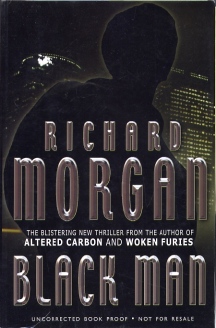
Very Repairman Jack, right?
In the intervening years, it seems to have crept farther into the future, and in the US, at least, it has a rather different name, to wit: 'Th1rte3n' (Del Rey / Random House ; July 3, 2007 ; $24.95). Given the long interval and the switch from the Takeshi Kovacs series that Morgan felt he had finished, readers might have some concerns with regards to 'Black Man'. (That's the book I'm currently reading; that's what I'm calling it.) I know I did. The plot premise (one genetically engineered soldier chases another) did not seem, on the face of it, all that promising, though I liked what Morgan had to say about the world. And the two years it took him to write it made me think that the book presented him with some problems, of the sort that might not be that easy to work out. I approached this book with some trepidation, thinking I might not like it.
Thankfully, that proves not to be the case. I'm well into 'Black Man', and I think it may be Morgan's best book yet. It seems to pretty much jive with the Kovacs universe in a prequelish sort of way. But mostly, as I read 'Black Man', I'm reminded of what a good writer Morgan is, how well he writes on a prose level. With his facility for language, he effortlessly immerses the reader in a future that seems hyper-violent (of course), weird and almost foreign but organic – a seamless whole. Percolating underneath are all sorts of interesting riffs on the present, of course, but as the characters grab you and the pieces fall into place you'll get that frisson of science fiction joy. A world unfolds before your eyes.
But in this world, with just the book itself as an object, there is plenty of interest as well. Let's get back to the 'Black Man' / 'Th1rte3n' dichotomy. Most obviously, there's the title. Morgan went into some detail when I talked to him about the whole concept of a "Black Man", symbolic on a number of levels, from race to the secrets within us all. The concept was the core of the novel and to re-title it does it an injustice. Still, one can see why US publishers might be gun-shy at such a title. Nothing gets the pot stirring like accusations of racism. So they chicken out. No surprise.
But it gets much better. Both the US and the UK copies give you the basic setup. The "thirteens" were genetic supersoldiers. After the war they were sent to Mars, because, well, they weren't really human and they were quite dangerous. Carl Marsalis is an exception, a thirteen who gets to stay here so long as he does the government's bidding. A thirteen has escaped from Mars and beat a bloody path to Earth. So far, so good on both sides of the pond. But here’s where it gets different. The US DJ says: "But Marsalis found a way to slip back–and into a lucrative living as a bounty hunter and hit man. That was before a police sting landed him in prison–a fate worse than Mars, and much more dangerous." Covering the same territory, the UK ARC back covers tells you: "Carl Marsalis is ... a genetic freak and an unwelcome reminder of all that is dark in the human psyche–he is, in every sense of the words, a Black Man. And at the moment he's beyond the UN's jurisdiction, banged up in a Florida jail for financing an illegal abortion. So when the US police call for help, Carl cuts a deal."
I find it interesting how the politics of the day impact the marketing of a very political book. This is novel that brings the famous "Jesusland" Internet map to life. But in order for it to sell in real Jesusland, you have to cut a deal. Because clearly here in the US the word "abortion" will cause intelligent SF action readers to set their hair on fire, thus impacting book sales negatively. Random House has high hopes for this book. I can see why. It's a smart, gripping, textured SF thriller. Why curdle the mix with the "a-word", sure to cause as much twitting and fretting as the title, oh my gosh, 'Black Man'. Can't have that! As Frank Zappa once said, "It can't happen here."
So I am asking all my readers to refrain from any hair-setting fire activities now that I've spilled the beans. 'Black Man', 'Th1rte3n' (=6ix+Se7en!), whatever the title, it's the same book – fantastic, Richard Morgan's best work yet. All I hoped was that it wouldn’t suck. It doesn't. Not a bit. It's wonderful. Welcome back, Richard Morgan. He's touring in late July; he stops in Seattle Washington at the University Bookstore 7/23, at Powell's in Portland, Oregon, on 7/24, at Booksmith in SF CA on 7/26 and at Comicon in San Diego on 7/28. (Subject to change without notice.)
You'll note, of course, that he's not visiting Florida. Can't say I blame him.
06-19-07: A Review of Jim Crace's 'The Pesthouse'; MP3 of Vampire Fiction Report for NPR
Today I am posting a review of Jim Crace's 'The Pesthouse'. As I wrote the review, I realized that the strength of this book is precisely the same as that of much of the great science fiction currently being written. Like Cory Doctorow, like Richard Morgan, like Rudy Rucker and Vernor Vinge, Crace knows that he's not writing a novel about the future. Stylistically, Crace could not be farther from these science fiction writers. There's no speculation about technology, and the plot involves none of the usual science fiction shenanigans. This is not the apocalypse of the farmer's market, not Mad Max the Singularity.
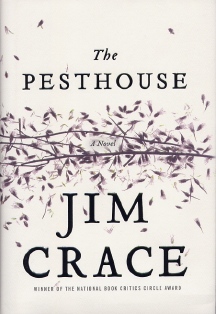
All the leaves are brown and the sky is gray.
But like Doctorow and other SF writers, Crace intimately threads his imagination of the present into his invented landscape. The process of sublimation is entirely unconscious, and the effect is in some sense that of a dream. 'The Pesthouse' really does seem like a fever dream from the reader will never quite awaken. Crace has indeed stripped everything from his world, including genre. All that is left are the people, the landscape – and the language. There's a poetry to the writing here that makes reading a joy, but does not draw attention to itself. Crace gets out of his own way and lets the story tell itself.
Techno-SF readers may think 'The Pesthouse' will be overly dry or literary. They'll be surprised at how effectively Crace has remixed the present, as well as his ability to discover plot and humor in his stripped-down world. Those coming to Crace from the world of highfalutin' litrachur will be swept away by the language. Readers who simply pick up 'The Pesthouse' hoping for a good story, well-written and imaginative will not be disappointed, so long as they’re not expecting motorcycles and machine guns.

Post Mortem
Here's a link to a high-quality MP3 version of last Saturday's report for NPR. Enjoy!
06-18-07: A 2007 Interview with Jim Crace
"That's an optimism which is made from granite."
You might not think that a novel in which America has been reduced to rubble and roaming scavengers would be likely to be optimistic. But Jim Crace thinks that optimism has to be earned. It has to be forged.
And fiction can help. "If you can look, as I did with my book 'Being Dead', at the absolute facts of what death represents – the putrefaction, the finality – if you can look at that and still feel optimistic, then that's an optimism which is made from granite."
Crace has more than a bit of granite about himself. Our conversation had the feel of finely turned wood, of polished surfaces of marble. His new novel, 'The Pesthouse' has a forged-in-the-fire feel, and as we spoke of his reasons for writing the book, the layers beneath just peeled away. 'The Pesthouse' is a novel about perceptions of the United States that operates by popping us from the top of the heap to the bottom. That's just the first of a series of inversions that Crace undertakes, and to hear him talk about his new book is fascinating.
So have at it. Here is the MP3. Here is the RealAudio file. Welcome to the forge of fire. Be prepared.
